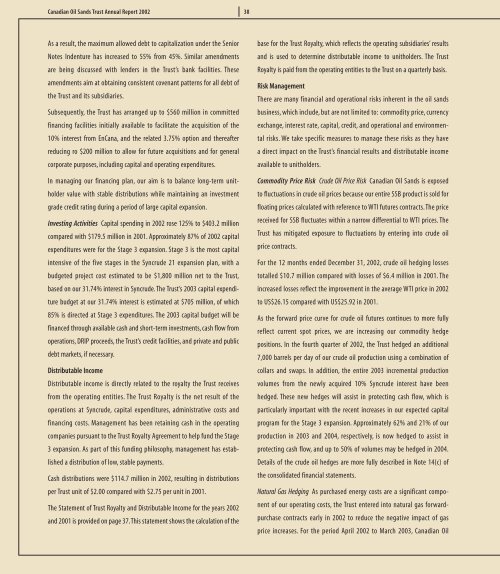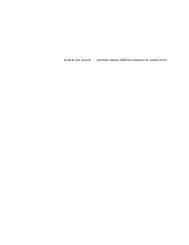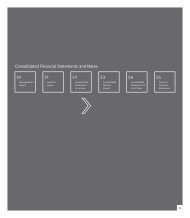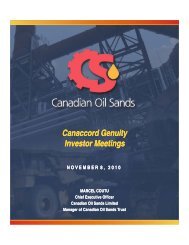Full Annual Report (PDF 1.39 MB) - Canadian Oil Sands
Full Annual Report (PDF 1.39 MB) - Canadian Oil Sands
Full Annual Report (PDF 1.39 MB) - Canadian Oil Sands
You also want an ePaper? Increase the reach of your titles
YUMPU automatically turns print PDFs into web optimized ePapers that Google loves.
<strong>Canadian</strong> <strong>Oil</strong> <strong>Sands</strong> Trust <strong>Annual</strong> <strong>Report</strong> 2002 38<br />
As a result, the maximum allowed debt to capitalization under the Senior<br />
Notes Indenture has increased to 55% from 45%. Similar amendments<br />
are being discussed with lenders in the Trust’s bank facilities. These<br />
amendments aim at obtaining consistent covenant patterns for all debt of<br />
the Trust and its subsidiaries.<br />
Subsequently, the Trust has arranged up to $560 million in committed<br />
financing facilities initially available to facilitate the acquisition of the<br />
10% interest from EnCana, and the related 3.75% option and thereafter<br />
reducing ro $200 million to allow for future acquisitions and for general<br />
corporate purposes, including capital and operating expenditures.<br />
In managing our financing plan, our aim is to balance long-term unitholder<br />
value with stable distributions while maintaining an investment<br />
grade credit rating during a period of large capital expansion.<br />
Investing Activities Capital spending in 2002 rose 125% to $403.2 million<br />
compared with $179.5 million in 2001. Approximately 87% of 2002 capital<br />
expenditures were for the Stage 3 expansion. Stage 3 is the most capital<br />
intensive of the five stages in the Syncrude 21 expansion plan, with a<br />
budgeted project cost estimated to be $1,800 million net to the Trust,<br />
based on our 31.74% interest in Syncrude. The Trust’s 2003 capital expenditure<br />
budget at our 31.74% interest is estimated at $705 million, of which<br />
85% is directed at Stage 3 expenditures. The 2003 capital budget will be<br />
financed through available cash and short-term investments, cash flow from<br />
operations, DRIP proceeds, the Trust’s credit facilities, and private and public<br />
debt markets, if necessary.<br />
Distributable Income<br />
Distributable income is directly related to the royalty the Trust receives<br />
from the operating entities. The Trust Royalty is the net result of the<br />
operations at Syncrude, capital expenditures, administrative costs and<br />
financing costs. Management has been retaining cash in the operating<br />
companies pursuant to the Trust Royalty Agreement to help fund the Stage<br />
3 expansion. As part of this funding philosophy, management has established<br />
a distribution of low, stable payments.<br />
Cash distributions were $114.7 million in 2002, resulting in distributions<br />
per Trust unit of $2.00 compared with $2.75 per unit in 2001.<br />
The Statement of Trust Royalty and Distributable Income for the years 2002<br />
and 2001 is provided on page 37.This statement shows the calculation of the<br />
base for the Trust Royalty, which reflects the operating subsidiaries’ results<br />
and is used to determine distributable income to unitholders. The Trust<br />
Royalty is paid from the operating entities to the Trust on a quarterly basis.<br />
Risk Management<br />
There are many financial and operational risks inherent in the oil sands<br />
business, which include, but are not limited to: commodity price, currency<br />
exchange, interest rate, capital, credit, and operational and environmental<br />
risks. We take specific measures to manage these risks as they have<br />
a direct impact on the Trust’s financial results and distributable income<br />
available to unitholders.<br />
Commodity Price Risk Crude <strong>Oil</strong> Price Risk <strong>Canadian</strong> <strong>Oil</strong> <strong>Sands</strong> is exposed<br />
to fluctuations in crude oil prices because our entire SSB product is sold for<br />
floating prices calculated with reference to WTI futures contracts.The price<br />
received for SSB fluctuates within a narrow differential to WTI prices. The<br />
Trust has mitigated exposure to fluctuations by entering into crude oil<br />
price contracts.<br />
For the 12 months ended December 31, 2002, crude oil hedging losses<br />
totalled $10.7 million compared with losses of $6.4 million in 2001. The<br />
increased losses reflect the improvement in the average WTI price in 2002<br />
to US$26.15 compared with US$25.92 in 2001.<br />
As the forward price curve for crude oil futures continues to more fully<br />
reflect current spot prices, we are increasing our commodity hedge<br />
positions. In the fourth quarter of 2002, the Trust hedged an additional<br />
7,000 barrels per day of our crude oil production using a combination of<br />
collars and swaps. In addition, the entire 2003 incremental production<br />
volumes from the newly acquired 10% Syncrude interest have been<br />
hedged. These new hedges will assist in protecting cash flow, which is<br />
particularly important with the recent increases in our expected capital<br />
program for the Stage 3 expansion. Approximately 62% and 21% of our<br />
production in 2003 and 2004, respectively, is now hedged to assist in<br />
protecting cash flow, and up to 50% of volumes may be hedged in 2004.<br />
Details of the crude oil hedges are more fully described in Note 14(c) of<br />
the consolidated financial statements.<br />
Natural Gas Hedging As purchased energy costs are a significant component<br />
of our operating costs, the Trust entered into natural gas forwardpurchase<br />
contracts early in 2002 to reduce the negative impact of gas<br />
price increases. For the period April 2002 to March 2003, <strong>Canadian</strong> <strong>Oil</strong>





